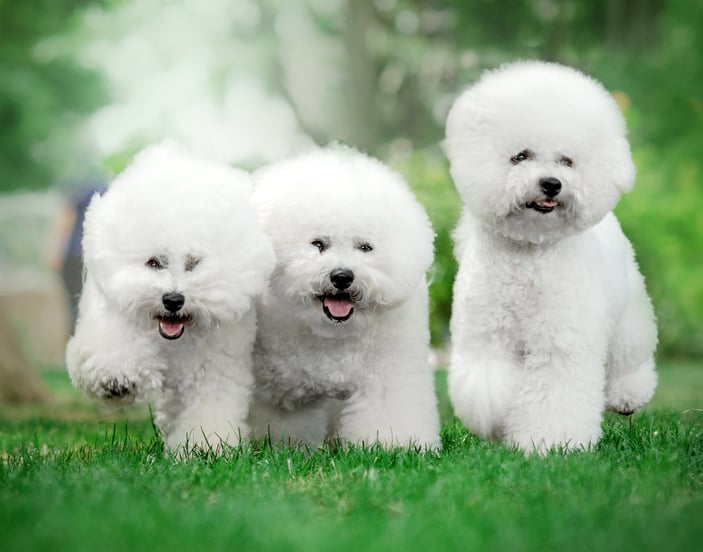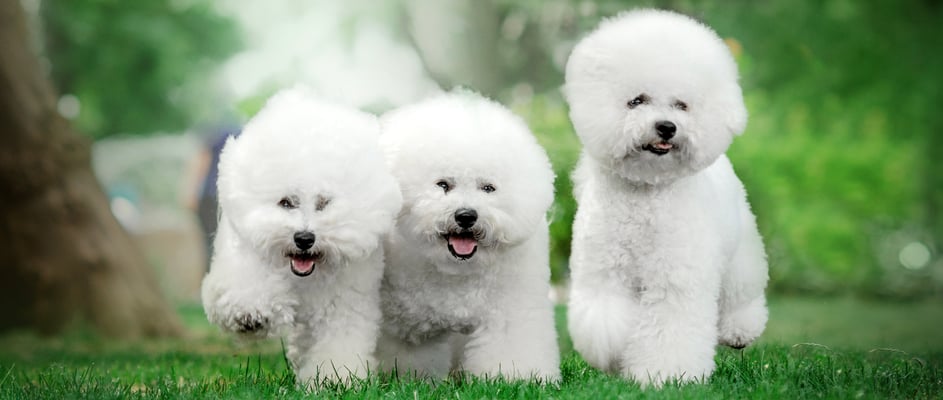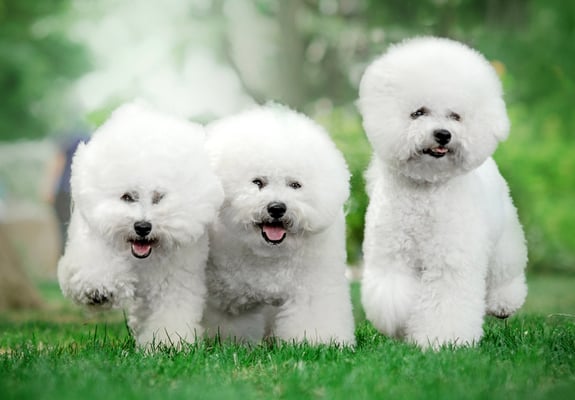The guide to owning a Bichon Frise.
Want to know everything there is to know about training your Bichon Frise puppy? Submit your email below, and we’ll send you a one-stop guide on all things puppy training!
Jump to:
Stats at a glance.
A history of the Bichon Frise.
The Bichon Frise (meaning 'curly lap dog' in French) has a story that goes back more than seven hundred years.
These cuddly little friends are believed to have first popped up on the island of Tenerife, where sailors couldn’t resist their sweet appeal and took them along on their voyages.
By the 14th century, their fun-loving nature and soft, silky fur had won the hearts of royalty all over Europe.
Paintings from those days often show these tiny pups, loved for their devotion and kind spirit.
Today, they remain popular as their powder-puff coats aren’t just eye-catching, they’re also low-shedding, making them a hit with allergy-prone owners.
But their real magic lies in their character. Bouncy, social, and endlessly curious, they thrive in lively homes or quiet apartments, as long as they’re near their favourite humans.
Don’t let their size fool you. Bichons pack energy, wit, and affection into every tail wag. They’ll chase a ball with gusto, then melt into your lap for snuggles.
Their love of mischief means they’ll keep you laughing, whether they’re “helping” with chores or showing off tricks for treats.
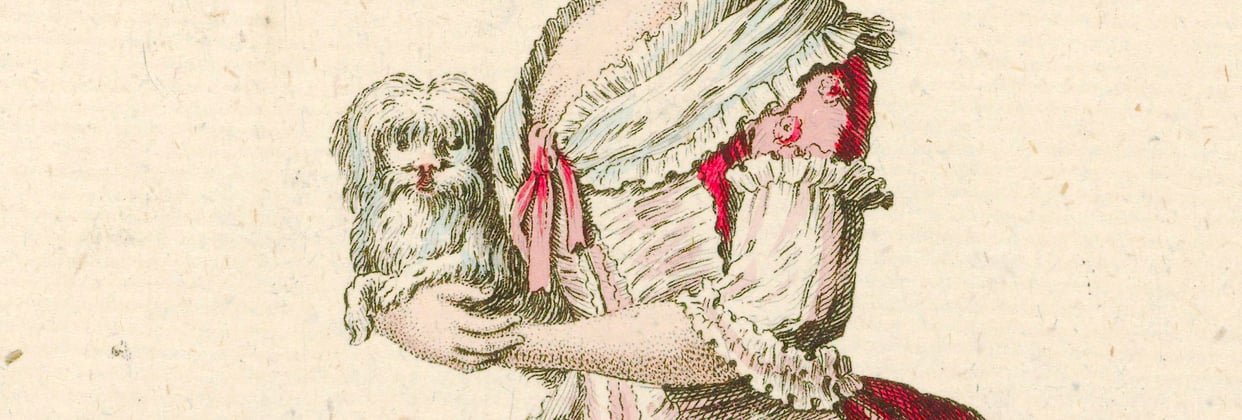

What to expect when buying a Bichon puppy.
A Bichon Frise puppy will cost anywhere from £600 to around £2,000 in the UK. Prices will vary based on breeder experience, location, and family history (more for award-winning show dogs). Always visit breeders in person as reputable ones will welcome questions, show you health certificates, and introduce puppy parents.
If they seem more interested in your lifestyle than your wallet, you may have found a keeper. Also, consider rescue groups, too, as many adult Bichons need second chances at love.
Colours and coat types.
Bichons are famously white dog beauties. Occasionally, they may show slight cream or apricot shading, especially on their ears. Yet most owners and fans love the classic, puffy white look.
Coat types.
Their signature double-layer, undercoat plus soft outer layer gives them that iconic powder-puff appearance:
Curly coat: Dense, plush curls that require regular brushing to prevent matting
Minimal shed factor: Why many list the Bichon Frise as hypoallergenic
For gentle washing tips, read our handy guide on how to bathe a dog. A helpful routine keeps that poil or pelage (French for ‘coat’) in prime condition.





Size and weight.
Bichons are small and compact. Most stand about 23-30 cm at the shoulder.
Their average weight is usually from 3 to 6 kg. Though they’re small, they’re full of energy. It’s best to be mindful of any extra pounds, as obesity can affect their health and temperament.
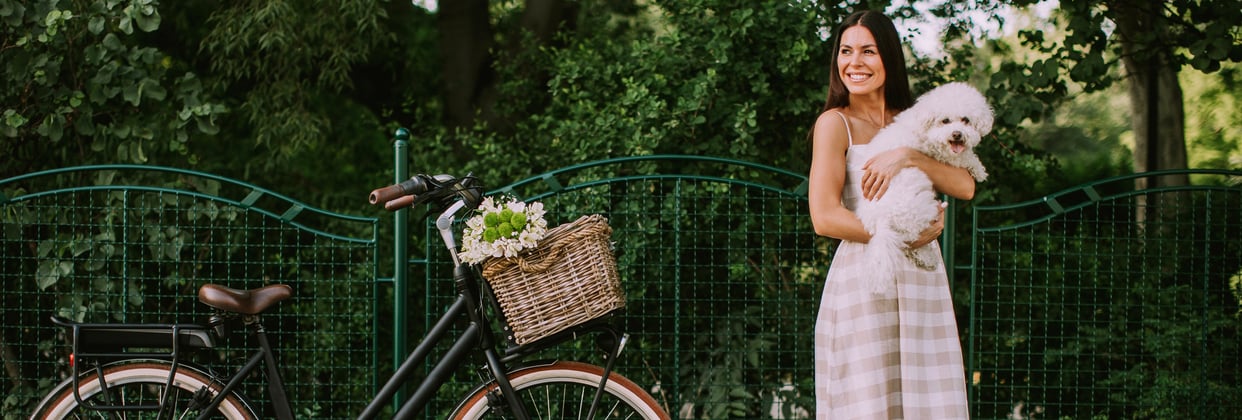

Temperament and behaviour.
Do Bichon Frises make good pets?
Absolutely. Bichon Frises are affectionate, playful, and famously cheerful. Their health and temperament tend to blend well with families, singles, and seniors. They’re generally up for both a cuddle on the sofa or a quick play session in the garden.
Are Bichon Frises good with kids?
Yes, these sweet Bichon Frise pups typically adore children. Just be sure youngsters learn to handle them gently. It’s always wise to supervise playtime for any puppy.
Are Bichon Frises good with cats?
Many Bichons get along well with feline friends, especially if raised together from a young age. Their easy-going temperament means they can adjust with some patient introductions.
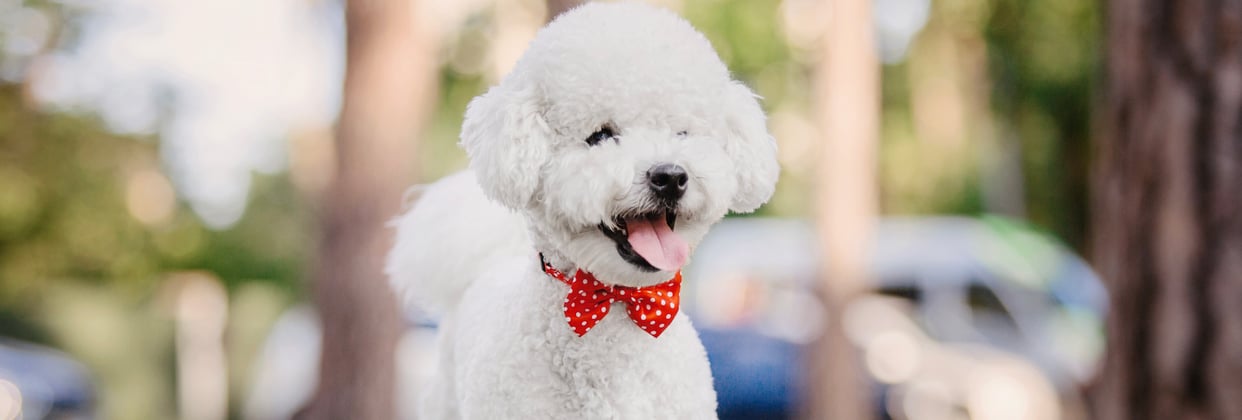

Do Bichon Frises suffer from separation anxiety?
Being social pets, Bichon Frises are more prone to missing their people. They love company and might feel insecure when left alone for long periods. If you’re out all day, consider a dog walker or a friendly neighbour’s help. For added tips, see our advice on how to make your dog happy and our guide to separation anxiety.
Can Bichon Frises be left alone?
They can handle short hours alone, but they yearn for interaction. Bichons thrive as companion dog pets, so too many solitary hours can lead to unwanted habits.
Can Bichon Frises live in apartments?
Indeed! Bichons are small and adaptable, so they settle into apartment life well. Just create fun indoor games and a reliable potty routine. A quick daily stroll also keeps them and your neighbours content.
Do Bichon Frises bark a lot?
They can be a bit vocal if they sense strangers or if boredom creeps in. Early, consistent training helps curb excessive barking.
Training a Bichon Frise.
Don’t let their cute fluffiness fool you, they’re bright and respond well to positive methods. They’re quick learners but can show a touch of stubbornness on occasion.
For success:
Start early socialisation
Keep sessions lively and short
Use treats and praise (they love validation)
Incorporate crate training for a calm bed space
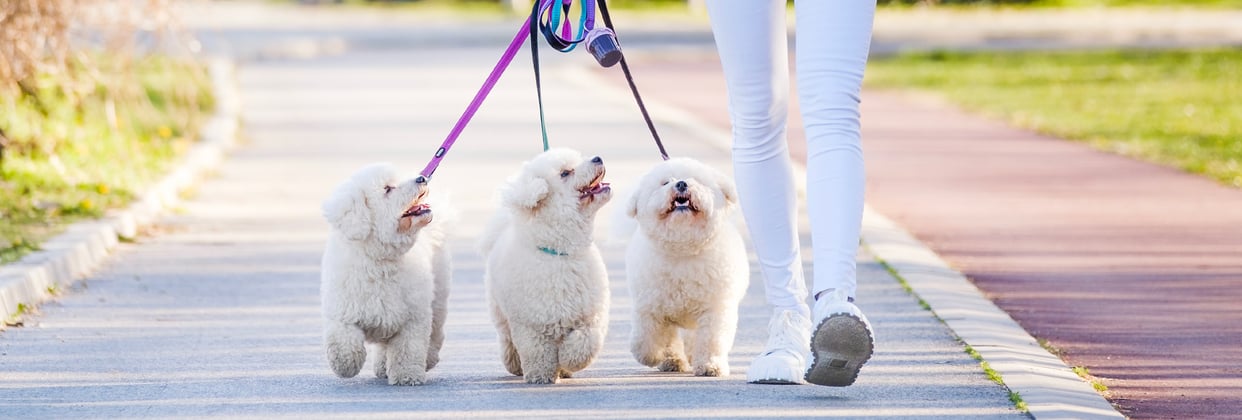

Shedding and grooming.
Bichon Frises generally don’t shed much, so you won’t see hair everywhere. However, their thick double coat demands frequent brushing, ideally several times a week to prevent matting.
A professional groomer visit every 4-6 weeks keeps them tidy. At home, gentle combing helps maintain that round, cloud-like cut. Watch for flea or dirt build-up by consistently checking their fur, especially for dogs who love a romp outside.
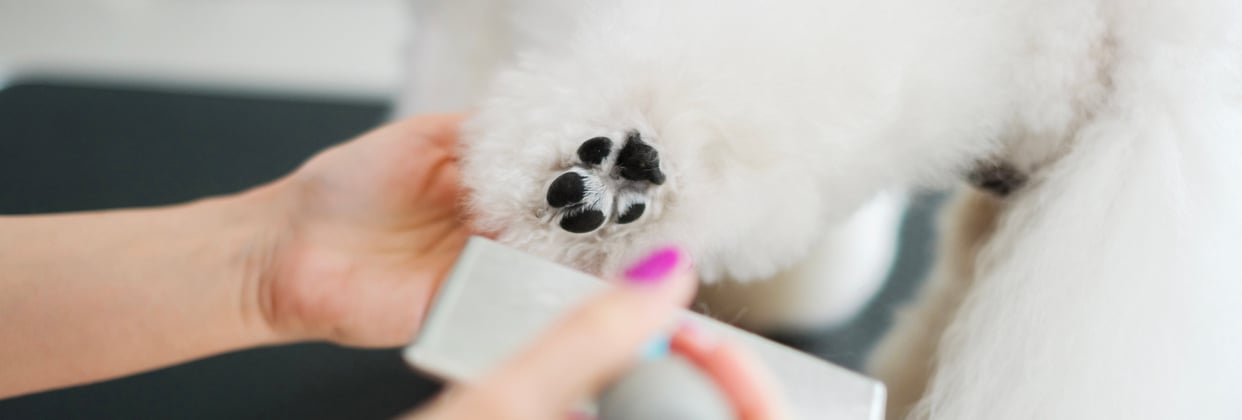

Exercise and mental stimulation.
Although small, Bichons enjoy brisk walks and play sessions. About 30 minutes of daily exercise meets exercise needs without overdoing it. Mental enrichment like puzzle toys or short trick sessions keeps them happy.
Because they’re quite smart, daily brain games can reduce boredom. These can include hide-and-seek, fetch, or even mini agility jumps (just not too high to strain those little legs).
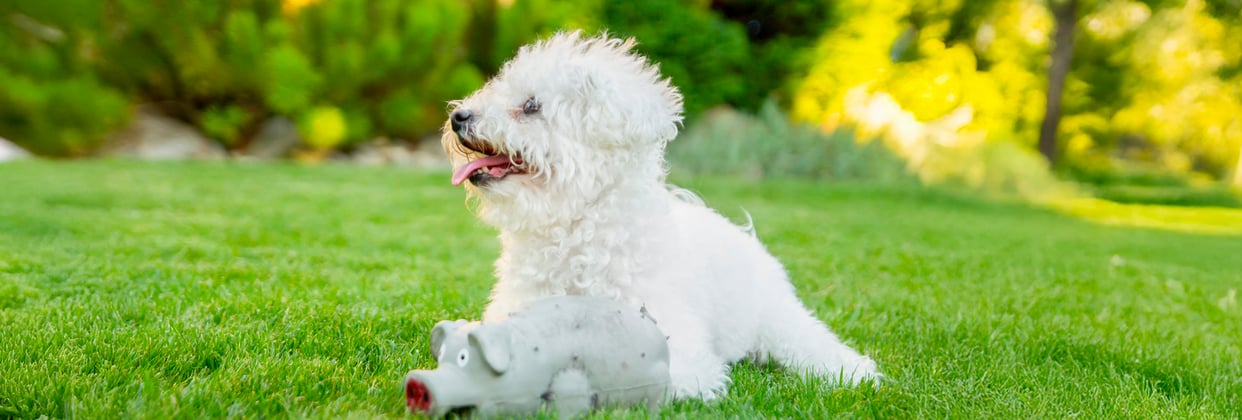

Feeding and nutrition.
A balanced diet keeps your Bichon’s coat glossy and their tail wagging.
Aim for:
High-quality kibble or wet food that meets their size and energy level
Split meals into two or three small portions per day to ease digestion
Monitor treats - Bichons don’t need large amounts
If your Bichon is a rescue dog with an unknown dietary past, transition foods slowly. For more helpful feeding guidance, see our insights on grain-free dog food and the best wet dog foods.
Common health issues in Bichon Frises.
Like any purebred Bichon, they can develop breed-specific conditions. Regular vet visits are key to spotting early signs. Here’s a quick snapshot:
Note: The pricing above is for illustrative purposes only and varies subject to location, vet practice, and many other factors. Staying attuned to your pup’s health and temperament helps ensure early treatment if needed.
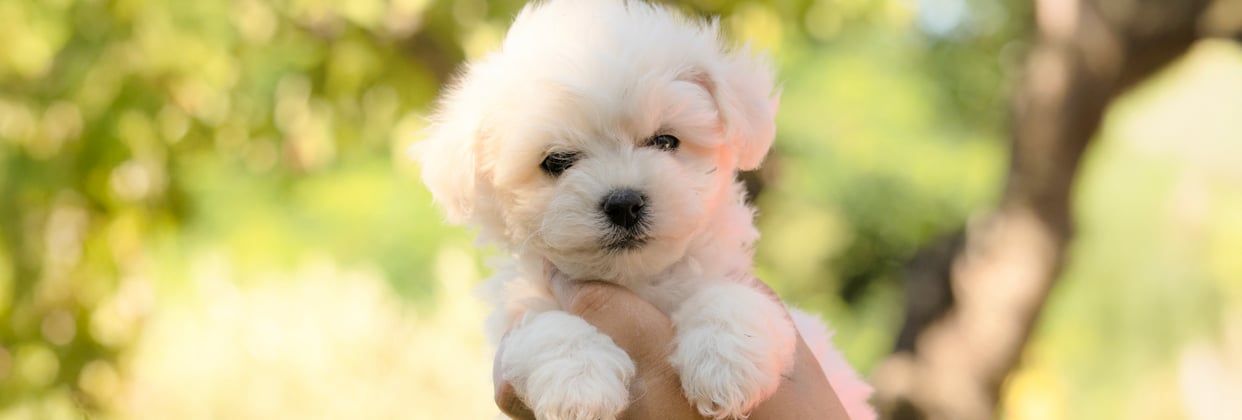

Pet insurance for Bichon Frises.
Given that the breed can be prone to conditions like bladder stones and diabetes mellitus, solid dog insurance offers peace of mind. Vet bills can be high, so comprehensive coverage safeguards against unexpected costs.
For coverage, see our page dedicated to this dog breed at our Bichon Frise Pet Insurance page.
You’ll find:
Lifetime coverage for chronic issues
Support for veterinary fees
24/7 online vet access
Extra perks for grooming and behaviour advice
Keep your Bichon relaxed and healthy so you can enjoy many fluffy, joyful years together. Care, comfort, and companionship ultimately come down to understanding their needs, offering love, and sharing plenty of laughter.
